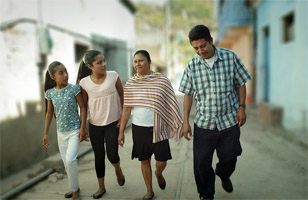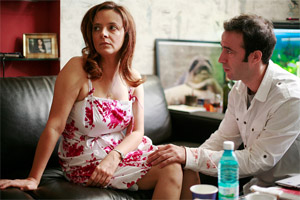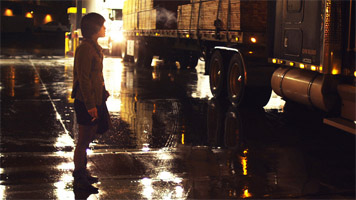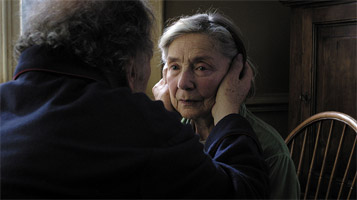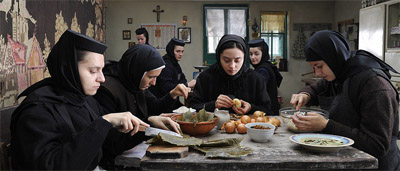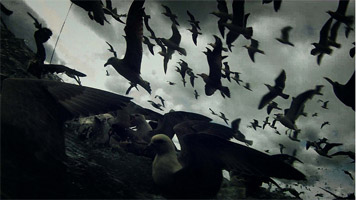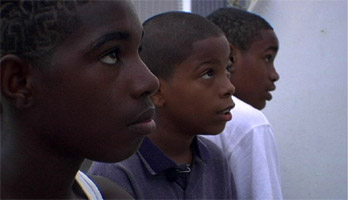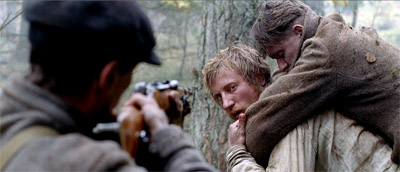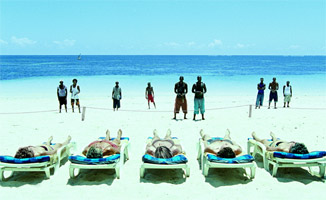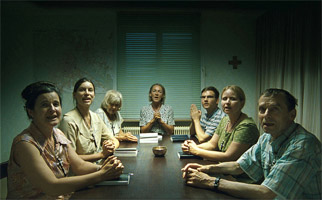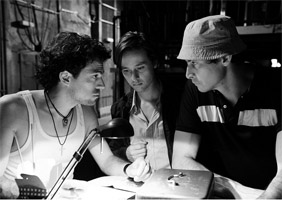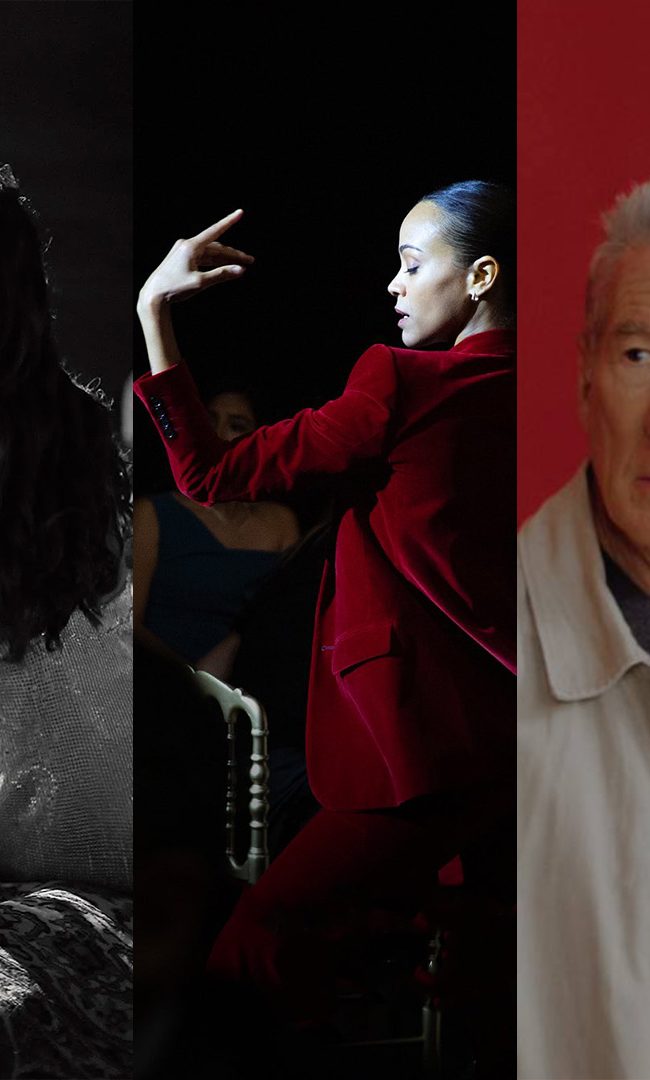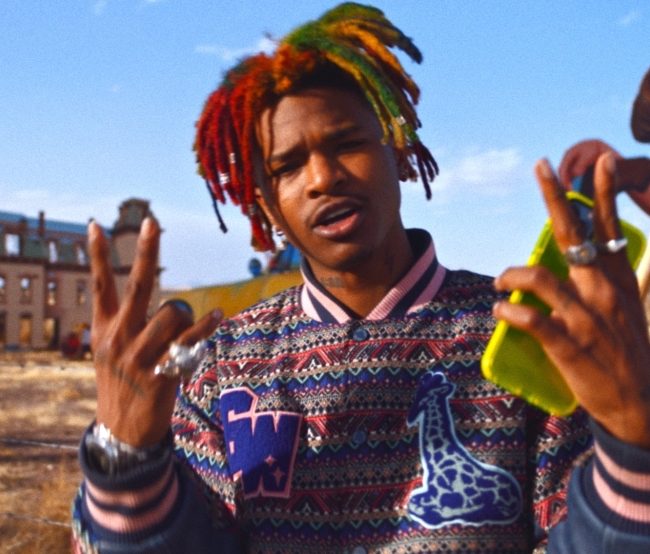The 2012 AFI Fest runs from November 1st-8th. Visit the festival’s official website for more information.
It’s AFI Fest time again—this year there will be splashy gala screenings including Ang Lee’s Life of Pi, Spielberg’s Lincoln, and the highly-touted Hitchcock, directed by Sacha Gervasi and starring Anthony Hopkins, Helen Mirren and Scarlett Johansson. There are also sections dedicated to new American and international filmmakers, but where AFI Fest shines brightest is giving L.A. audiences a first look at a broad selection of auteur films from top festivals around the world (with free admission). Here are some highly-recommended selections.
In Here and There, which won the top prize in the Critics’ Week section of Cannes, director Antonio Mendez Esparza delves ever-deeper into the human toll of the Mexican diaspora, following the protagonist of his award winning 2010 short Una y otra vez back to his home town, where he re-unites with his family. Mendez is a master of simplicity, creating beautifully intimate scenes of quiet intensity, most often in long, unedited shots with a locked-down camera. He draws outstandingly nuanced, natural performances from his cast, as they struggle through a life-threatening pregnancy and the protagonist’s inability to find steady work. It’s an enlightening look at a side of contemporary Mexico that gets overshadowed by the country’s problems with corruption and crime. These characters have a sense of self grounded in a powerful work ethic and find their greatest happiness in family life: at one point the lead character, a musician, sings: “I don’t like being poor / Even less to be rich / I just like being humble with my real people.” The prospect of migration to the U.S., and finding work, has a constant, powerful pull, but the emotional cost of leaving family behind has a terrible poignancy.
In the remarkably consistent school of never-turn-off-the-camera contemporary Romanian film, Radu Jude pushes the farthest in the direction of comedy. His follow-up to 2008’s brilliant satire of the world of TV advertising, The Happiest Girl in the World, is the equally dark and hilarious Everybody in Our Family. We first meet 30-something Marius sleeping in, fighting with his blanket in his messy-teenager bedroom next to a giant stuffed octopus. A visit to his parents—where he tries to borrow their car to take his daughter to the beach for her birthday (the octopus turns out to be her birthday present)—goes badly wrong when a minor disagreement turns into a vicious exchange. “What kind of man are you?” spits Marius’ dad. “Only 15 days a year with your child!” “Go to sleep, old fart,” replies Marius, causing his dad’s rage to explode like a bag of blood. Things turn even worse at his estranged wife’s apartment, where a disagreement with her new husband escalates into a full-on war. Radu creates a scenario that’s both brutal and very, very funny, rooting his over-the-top scenario in a rich understanding of his characters and the world they live in.
At first glance, Mike Ott’s Pearblossom Hwy has the familiar tropes of current American indie film: road trip, misunderstood outsiders, a yearning to mend broken family connections. But what distinguishes it are its two main characters: as co-written by Ott and Atsuko Okatsuka, and performed by Okatsuka and Cory Zacharia, they’re a million miles from your typical don’t-know-what-to-do-after-college saddies; they’re genuine eccentrics who see the world around them all too clearly. As a character similar to the one he played in Ott’s previous feature Littlerock, Zacharia is a bold and winning gamble for the lead role; he speaks with an oddly theatrical and somewhat childlike inflection, casually dropping pearls of crazy wisdom, and his unusual look is somehow photogenic. Okatsuka plays his introverted alter-ego, a prostitute whose beloved grandmother is dying back in Japan. There’s something unusual about her sex-for-pay encounters—a strange tension. It’s her vulnerability. The two of them keep rolling along on their quest to find Cory’s biological dad with the help of studmuffin John Brotherton, who plays Cory’s brother and straight man.
Despite Kiarostami’s exile and Panahi’s house arrest, Iranian film manages to stay vibrant and inventive, if strictly apolitical. The Last Step is an ingeniously layered and diffracted story with more twists than a strand of DNA. The opening scene—an actress (Leila Hatami of A Separation) can’t keep a straight face as she delivers a line to her deceased husband—fans out into a wry and clever narrative about how her actual husband, an architect who designed a perfect building with a single, fatal flaw, died. Director Ali Mosaffa skillfully moves back and forth in time to reveal pieces of the puzzle, every “aha” moment followed by new, contradictory information. The truth, particularly in terms of who’s responsible for the husband’s death, proves to be infinitely slippery.
Amour, which won a second Palme D’Or for Michael Haneke this year, is a genuine horror movie, and not the kind you laugh about afterwards. It goes to the heart of one of the most painful scenarios imaginable: slowly losing a loved one to a series of debilitating strokes. Like all of Haneke’s recent work, this film is in its own stratosphere—the excellence of the cinematography, editing, and acting can’t be separated out; every fiber of every element of the film thoroughly embodies the unique thing-in-itself that Amour is. That said, it’s wonderful to see legends like Jean-Louis Trintignant and Emmanuelle Riva, now in their 80s, once again in leading roles. The film’s climax is one of the toughest and sweetest I’ve seen, a moment of crystalline clarity and compassion. But it’s a Michael Haneke film, so at the end you’re left with a void in the middle of the story for your imagination to puzzle over and run free in. [You can read Michal Oleszczyk’s full H2N review here]
Cristian Mungiu has been the leading light of the Romanian New Wave of recent years, winning a Palme D’Or for 4 Months, 3 Weeks and 2 Days in 2007. Beyond the Hills is a departure for him. The story centers on two young women who grew up together in an orphanage and developed a romantic relationship; they reunite after a separation, and one of the women, living in a convent under the influence of a stern “Father,” has developed a strong faith within the Christian Orthodox religion, and wants their friendship to be strictly platonic, while the other wants desperately to continue the relationship; her thwarted desire results in a violent form of madness. The world inside the convent walls is shown in a style that retains the long, austere, unedited master-shots typical of Romanian cinema, but goes some way toward dropping the dark and dry humor, taking its earnest characters, for the most part, quite seriously. The camera is still hand-held, but it’s held steady, creating an effect that, combined with the subject matter and production design, feels like a modern take on Carl Theodor Dreyer. On the other hand, when the characters go into town, we’re back in Mungiu’s familiar world of cynical, gossipy, soul-dead bureaucrats. This juxtaposition is a logical step forward in the discourse created by his body of work and Romanian cinema in general: if the society you’re observing is so contemptible, then what might be the opposite of that? Is there a better place, where people are still guided by some kind of idealism? The answer is far from a yes—or a no for that matter; the inquiry plays out in a narrative that goes to fascinating extremes.
Leviathan is an almost wordless 87 minutes of cinema at its purest. Directors Lucien Castaing-Taylor and Verena Paravel capture an amazing range of footage inside and around a North Atlantic fishing ship, and assemble it into something cruel, frightening and indescribably beautiful (but I’ll try). The ship resembles a voracious, living organism—the scenes of fish getting their heads chopped off and being gutted are brutal, with macabre shots of blood dripping everywhere and cartoonish close-ups of severed fish-heads with bulging, unseeing eyes sloshing around in a soupy hell (not recommended for pescatarians). There are breathtaking shots that dive in and out of the water, alternating between the silvery underside of the ocean surface and a massive flock of Hitchcockian seagulls flapping their wings and diving in for their lunch. There are also trancey sequences where the burly fishermen go about their work in a sort of Zen-state, and footage of the underside of the ship, with swirling pinks and greens and shimmering flotsam and starfish—like a Cocteau Twins album cover come to life. The soundtrack, made up largely or entirely of actual production sound, is a work of art in itself—a fantastic musique concrète collision of human-, water- and machine-based sonic textures.
In Tchoupitoulas, two teenage boys, their younger brother and their adorable dog Buttercup get stranded on the streets of New Orleans; when they miss the last ferry home they end up watching and participating in the city’s nightlife. The story itself, what little there is, might be helpful to mainstream audiences as something to hold on to, but for purists (i.e. me) it feels unnecessary. This stunningly-shot film captures with sensitivity and flair the decaying and decadent carnival spirit of the city, as seen through the guileless eyes of the boys. William, the younger brother, is the film’s heart and soul, effortlessly expressive, open and fascinated, while his older brothers are typical teenagers, mostly sullen and withdrawn, sometimes quietly plotting stuff amongst themselves, but occasionally belying their age with flashes of innocent wonder. It’s probably the first New Orleans movie since Hurricane Katrina to not even mention Hurricane Katrina; it’s an immersive experience that focuses instead on what the city has always been and continues to be.
In the Fog breathes new life into the much-traveled topic of Nazis and WWII, in an intense, slow-burning narrative about a Belarusian partisan named Sushenya. Arrested and tortured by the collaborationist forces for an act of sabotage that he had warned his comrades against committing, he’s given the opportunity to save his life by working for the Germans as a spy. When he refuses, the ice-cold commandant, in a brilliant act of villainy, hangs his comrades and sends him home, making it appear that he betrayed them. This sets in motion the story of a principled man trying to understand how to live when he would have preferred to die. Director Sergei Loznitsa has a rare gift for deliberately and masterfully building to a series of incredibly intense climaxes, gradually turning up the pressure on his characters to distill and reveal their essence. Vladimir Svirskiy, as Sushenya, powerfully expresses pain and regret with his oceanic blue eyes, but the performances are ridiculously good across the board. This is pitch-perfect drama, worthy of Bergman at his best.
The work of Portuguese director João Canijo could be termed social realism, but he brings a totally fresh and unique style to the genre. The working-class themes of Blood of My Blood unfold in an elegant, gliding ballet between the blocking and camera movement that’s forever roving for interesting and unusual compositions. Canijo sometimes even runs two different side-by-side scenes simultaneously, conveying the feeling of people living on top of each other and up in each others’ business. Canijo’s excellent cast is headed up by force-of-nature Rita Blanco, playing a matriarch fighting to keep her young-adult children from ruining their lives—her son Joca is drawn into drug dealing, while her straight-laced daughter gets involved with a man with a dangerous secret.
The sexual and emotional lives of contemporary middle-aged women are an all-but-absent topic in film; Austrian filmmaker Ulrich Seidl jumps eagerly into that void in the first two installments of his new Paradise trilogy. Paradise: Love establishes zaftig divorcée Teresa as a bit of a control freak in an early scene where she goes into a diatribe against her slovenly teenage daughter. She’s leaving for a vacation in Kenya, where—after carefully disinfecting the surfaces in her hotel room—she hesitantly ventures into meeting the willing young local men, egged on by a savvy friend. “You have to smell their skin,” the friend advises her, “It’s unforgettable… It smells of coconut. I could lick and bite them forever.” Problem is, Teresa—who’s quite willing to open her purse for these men and the endless family emergencies they say they have to pay for—can’t accept that it’s all just a game, and falls into despair when the truth becomes unavoidable. Seidl is a fearless and thrilling director: together with his bi-continental cast he goes after the raw and exposed human moments and crafts emotionally brutal scenes that ring absolutely true, but he also has a light touch, and there’s always some humor lurking in the carnage. It’s fascinating and not a little tragic to see Teresa’s character shift from helpless romantic to hardened sex customer, and it’s a potent metaphor for the power relationships between first and third world countries.
In Paradise: Faith, Seidl shifts the focus to Anna Maria, Teresa’s sister, who shares a lot of her sibling’s control issues. She’s a rabidly passionate Catholic, who goes door to door to proselytize in Vienna’s immigrant neighborhoods, carrying foot-high statues of the Virgin Mary and announcing, “The Mother of God has come to visit. Do you know the Mother of God?” Her well-ordered existence gets shaken up when her Muslim husband Nabil shows up after a two-year absence, in a wheelchair, expecting her to take care of him in every way. Anna Maria’s religious fervor starts to take on ever-stranger forms as her disagreements with Nabil escalate into a full-on war. It’s a scenario bursting with weighty implications, but Paradise: Faith is also very funny, following Anna Maria into all kinds of extreme situations, including a scene with a shut-in who sees her and her Virgin Mary statue as a good excuse for some make-believe playtime, and a young Russian drunkard who seems to use Anna Maria as a stand-in for complicated feelings of need and anger toward her parents.
In Oh Boy, Niko (played by Billy Joe Armstrong-lookalike Tom Schilling), a sensitive 20-something drifting through his own life, unable to commit to anything, gets cut off financially by his dad and, despite his best efforts, walks into a series of disturbing and humiliating confrontations. Even a promising new romance with a woman he used to tease when they were in school turns into a grotesque scenario where old wounds surface at the worst possible time. It’s a very funny movie, with a series of brilliant character actors putting Niko through a spectrum of tortures and discomforts, but eventually, in the film’s beautifully tone-shifting, understated final act, the state of Niko’s existence is somehow made sense of, in a sense.
The Central Park Five is the latest of a number of recent documentaries to cast a light on gross miscarriages of justice that have resulted in innocent people getting convicted. What’s really insane about this case is that it happened in the full glare of the media spotlight. The 1989 case of a white, female jogger getting raped and horribly beaten in New York’s Central Park was one of the biggest crime stories of the 20th Century. What followed, followed the familiar template of these kinds of cases: the police department, under huge pressure to produce a perpetrator, rounded up some black and Latino teenagers that were known to be in the area at the time of the crime and coerced confessions from them. Once they were in the system, with a frightened and angry populace crying for justice, it was impossible to save them from being convicted. Celebrated documentarian Ken Burns doesn’t try to give a “balanced” version of the story; the evidence of the case, coerced confessions apart, never added up, and eventually a serial rapist made a complete, detailed confession. Four of the five wrongly convicted men give lengthy and in-depth on-camera interviews; the fifth one participates with an audio-only interview. The film is a thorough and compelling piece of agitprop that will hopefully have enough influence to bring some sanity into the American criminal justice system. The D.A. in charge of the case (much like the prosecutor in Capturing the Friedmans) remains unwilling to admit to having made a terrible mistake.
I was sadly unable to preview a number of interesting-looking films, including Matteo Garrone’s Reality, which won the Grand Prize of the Jury at Cannes this year; Garrone has emerged as the first Italian director in decades to take a cold hard look at Italian society and hold up an unflinching mirror. His last film, Gomorrah, was an exciting return to form for Italian cinema, and Reality, set in the world of reality TV, specifically “Grande Fratello,” the Italian version of “Big Brother,” looks like it’s definitely worth checking out.
—Paul Sbrizzi







